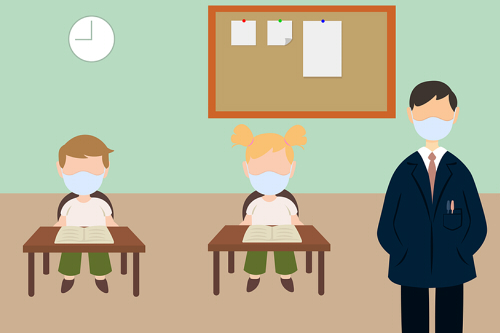Students May Earn Almost 10% Less Money over Their Lives Due to Covid-19’s Impact on Education: Study
Aditi Shrikant
Kids experiencing “corona-induced learning loss” equivalent to one year of schooling will earn 9% less money over the course of their lifetime, one study anticipates.
Almost three-quarters, or 73%, of the 100 largest school districts in the United States are opting for remote learning only this fall, according to Education Week. Without in-person classes, parents must juggle child care, at-home teaching, and working remotely if they are still employed.
That has a negative impact on the economy right now. “If you can’t get children back in the schools, you really can’t restart the economy in a robust fashion,” Scott Gottlieb, the former chief of the Food and Drug Administration, said in a June interview on CNBC’s “Squawk Box.”
But it’s not only parents’ income that will suffer due to remote learning. Kids’ potential future income may suffer as well, according to a new study published by the Organisation for Economic Co-operation and Development.
For each full academic year of “corona-induced learning loss,” kids in grades 1-12 could earn see their lifetime earnings drop by just over 9%, according to the OECD study. The loss of one-third of the school year – as kids experienced during school closures from March through May – could lower lifetime earnings by 3%.
That is, “if schools immediately returned to 2019 performance levels,” the report notes. “Disadvantaged students will almost certainly see larger impacts. And, with the forecast of further disruptions in normal school operations, the costs only grow.”

How education affects income
“In general, in the U.S., we find that each year of school results in an uptick in earning of 6% to 10%,” says Sarah Cohodes, an associate professor of economics and education at Columbia University. That includes years in college as well as core K-12 education.
There are three main theories as to why more education leads to increased income, says Cohodes, who is not involved in the OECD study.
The human capital theory, which states that what you learn in school is of value in the world. This doesn’t just include subjects you are tested on but also skills you learn from being in class, such as teamwork and problem solving.
Signaling, which means that if you have a high school diploma or other academic credentials, you are signaling to the job market that you are smart and accomplished.
Furthering your education expands your social networks, which gives you access to more jobs.
The impact of school closures and remote learning will not affect all kids equally, according to the study. “The economic losses will be more deeply felt by disadvantaged students,” the authors write. “All indications are that students whose families are less able to support out-of-school learning will face larger learning losses than their more advantaged peers, which in turn will translate into deeper losses of lifetime earnings.”
Remote learning is less effective than in-person learning
In 1916, the polio pandemic caused short-term school closures and quarantines in the U.S. Kids aged 14-17 during that pandemic ended up with less educational attainment in 1940 compared to their slightly older peers, according to a 2017 paper published by the National Bureau of Economic Research.
Unlike in 1916, kids today can attend virtual school. However, experts still find that this can have a negative impact on students. Virtual learning is associated with a higher probability of dropping out of high school than in-person learning, according to one 2020 study published in the Social Science Research Network.
The high school graduation rates from spring 2019 will probably show a slight increase in the rate of dropouts, Cohodes says: “Anecdotally we have already heard of high school students who, during the pandemic, were asked to supervise their younger siblings,” since no parent was available to be present. Along with being asked to take on more supportive roles domestically, older students might also need to pick up some work if someone in their family has experienced job loss.
“On the one side there is the family pressure, and on the other, there are learning issues,” she says. “It’s much harder to complete your coursework online.” These factors can distract students and lead them to give up on school.
‘I’m just worried it’s going to be even worse’
The findings of the OECD study are plausible, Cohodes says, and she warns that reality might be more grave: “I’m just worried it’s going to be even worse given what they are estimating.”
The study’s findings are based on remote learning from March to May. The combined effects of a lack of necessary electronic devices, broadband internet, and supervision to complete course work will all be amplified the longer remote learning goes on.
Plus, most schools get their funding from state and local aid, which is suffering right now. Without additional federal aid, which does not appear to be forthcoming, there might have to be layoffs. “If you think your virtual learning is crappy now, it will be even crappier when class sizes go up 5 to 6 students per teacher,” she says.
So if sending your kids to school is unsafe due to Covid-19, but remote learning can be less effective and likely to result in loss of income further down the line, what is the best solution to ensure students are safe and learning?
“The best investment in children right now is ending the pandemic,” Cohodes says. Then there needs to be investment in in-person learning, summer programs, and tutoring, she says. Without those countermeasures, remote learning is likely to have long-term negative effects, especially on the most vulnerable.








